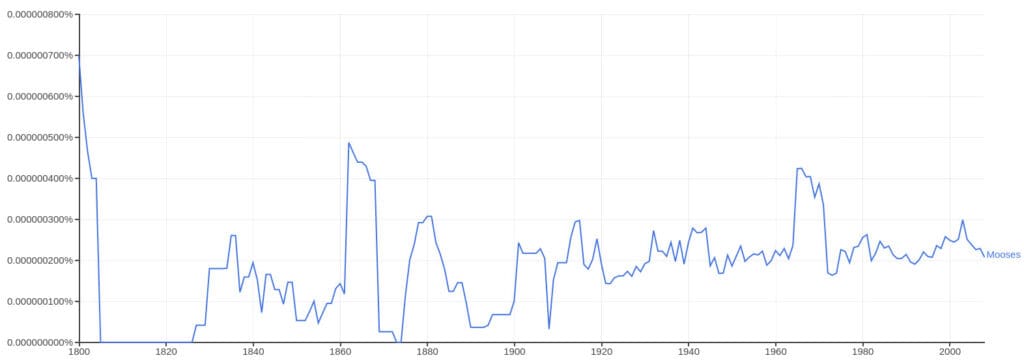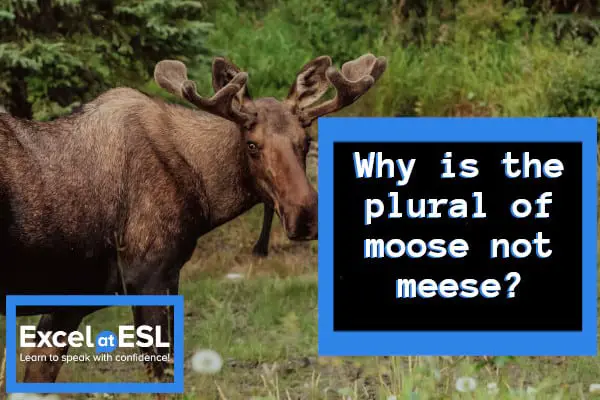My last article talked about the plural for the word “chief”. We’ll continue along in the same vein this time around by discussing the plural for the word “moose”. This word might give you trouble when you first meet it. You might assume that, like the word “goose” whose plural is geese, the word “moose” would form its plural as meese.
This isn’t the case, however. The plural form of moose is not meese because moose was borrowed into English from a native American Algonquin language. The word “moose” is not a native Old English word. Newer English words don’t change the same. Old English words underwent sound changes that leave us with irregular plural forms.
What is the plural for moose?
You could be forgiven for thinking that the plural for moose was meese. Especially if you’ve never seen one. If you aren’t from the parts of North America & Northern Europe where moose roam, you have probably never seen one and never thought about what to call more than one of them.
The plural of moose is moose. One moose, Two moose.
The word “moose” came into English from an Algonquin language spoken in North America. Moose are animals which don’t exist in most of Europe. When English settlers who moved to the new world encountered moose for the first time, they had no word for these animals because they don’t exist on the British isles. So in classic English fashion, the foreign word for the new animal was borrowed into English. Most likely sometime around 1600AD.
Why not mooses?
This might leave you with the question, “Why didn’t the plural become mooses?”
This is an excellent question to ask. Frequently, when a new word is borrowed into English, it takes the regular plural form. We saw this was the case with the word “chief” in my last article. You can read that article here.
Languages tend towards regularity. People don’t want to remember a whole bunch of irregular ways to form words, so most of the time the new words that are borrowed or created in a language receive regular transformations such as when creating plurals or the past tense for example.
The irregularities that exist in English are almost all because those words are very old English words. They have been around in English for hundreds, if not over a thousand, years. This means that they have experienced the many shifts and transformations English has gone through in its history and we still have evidence of that history today.
Believe it or not, when moose was first borrowed into English it received a regular plural form. The plural of moose was actually mooses! We can see this is the case when we consult a language corpus such as google’s Ngram viewer which let’s us look at instances of words in books through time starting from 1800AD.

We can see that the word “mooses” was most popular in 1800. This falls in line with what we know about moose’s plural. The word was borrowed into English sometime around 1600AD. At that time, it received a regular plural form as well. We can imagine that data about word usage earlier than 1800AD would reflect this. This usage quickly faded over time, however. Especially into the 20th century. By the 1900s, the plural “mooses” was barely represented at all.
Today, the reason that the plural of moose is moose is because of regularity. It’s true! In English, all other species of animal which belong to the deer family share this way of creating the plural for their names.
| Deer Family Animal | Plural |
|---|---|
| Moose | Moose |
| Deer | Deer |
| Elk | Elk |
| Reindeer | Reindeer |
All of these animals use the same word unchanged for both their singular and plural forms. It makes sense then that moose, which are also a part of this animal family, would form the plural in this way. It was by analogy that moose lost its regular plural form and became more inline with the rest of the animals in its family.
Why is the plural of goose “geese”?
This leaves us with the question, “why is the plural for goose so strange then?”
Goose is an old word. It’s been around since before English split from its ancestor language thousands of years ago. This means that the word “goose” has been with English since the beginning. English words that are this old are frequently irregular. The English language has gone through many changes throughout its history. These changes are still evident in words we inherited from the past.
It might surprise you to learn that, originally, the word “goose” had a regular plural form in Old English.
The Old English word for goose was “gōs“. At that time, the plural for this word was “gōsiz“. This is exactly what you would expect from this word. It’s similar to the modern English -es plural forms.
| Singular | Plural |
|---|---|
| house | houses |
| crash | crashes |
| horse | horses |
| lynx | lynxes |
| hose | hoses |
| leash | leashes |
So, why did it change? This was due to a sound shift that happened in Old English called I-Mutation.
I-Mutation
I-mutation was a sound shift that happened in earlier English history. To avoid a lengthy and confusing historical linguistics discussion, I’ll summarize this sound change simply.
Basically, sounds in the second syllable of Old English words influenced the pronunciation of sounds in the first syllable. We have many surviving modern English examples:
| tooth | teeth |
| foot | feet |
| full | fill |
| blood | bleed |
| mouse | mice |
So, at the time when this sound change was happening, the plural for Old English gōsiz became gēs. This sound change remains in English to this very day, which is why today the plural for the word “goose” is geese.
Conclusion
There you have it. The reasons why the plural for moose is not meese. Moose is a relatively new English word, while geese is very old. When English was experiencing the sound changes that transformed the plural of goose, the word “moose” wasn’t around to experience those same changes.
This leaves us with the situation where the words “goose” and “moose” sound similar, but they are actually quite different.
This article is part of a series on interesting English facts hidden in every day words. If you found this article interesting, you might enjoy others from this series. You can check out all of my Hidden History of English articles here.



